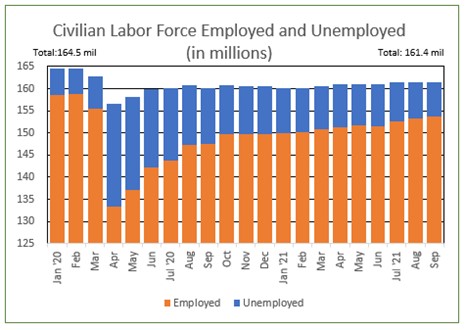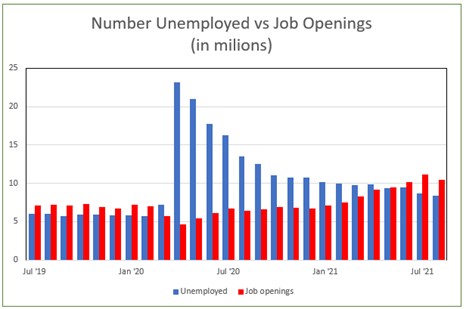The Challenging Course to Reviving the Post-pandemic Economy
There is a direct line from anti-vaxxers and anti-maskers to the slow recovery of employment since the outbreak of Covid-19. In September 2021 only 194,000 jobs were added to the U.S. economy, well below the projection of 500,000 jobs; total employment remained 7.7 million jobs below the pre-pandemic peak. More troubling is the decrease in the size of the labor force; a net of 183,000 workers left the labor force in September. That net loss obscures crucial disparity between male and female workers.
Women carry more of the burden of childcare than men, and this is where the link between employment and family support emerges. There were 296,000 fewer women in the labor force in September than in August, but there were 113,000 more men. Since January 2020, the labor force has lost a net of 1,157,000 men and 1,943,000 women, for a total of 3.1 million fewer participants.
In January 2020, the civilian labor force totaled 164.5 million workers, of which 158.7 million were employed and 5.8 million were unemployed. The unemployment rate was 3.5%. By April 2020, the labor force had lost 8 million workers, and the unemployment rate reached 14.8%.
As of September 2021, the labor force had partially recovered, reaching 161.4 million, with 7.7 million unemployed, and an unemployment rate of 4.8%.
Older workers are returning to the labor force at a slower rate than those under 55 years old. The number of 18-to-54-year-olds in the labor force in September was 1.9% below the pre-pandemic peak. For those at least 65 years old, there are 3.6% fewer in the labor force.
Persistence of the Covid-19 virus is more of a threat to older workers for whom in-person work presents health concerns. As with the number of women missing from the labor force, getting past the Covid-19 threat should bring back hundreds of thousands of workers, although many of the elderly will be reluctant to start a new career and choose to retire.
Much attention has been directed to the current mismatch between job openings and unemployed workers. In August 2021 there were 8.4 million unemployed workers. At the same time the Bureau of Labor Statistics reported 10.4 million job openings, a number that had been increasing monthly through July 2021 even as the number of unemployed workers had been declining.
During the two years prior to the onset of Covid-19, job openings slightly exceeded the number of unemployed workers. In March 2020 the number of unemployed jumped far above the number of job openings. Unemployment ballooned to 23.1 million in April, and job openings sank to 4.6 million from a January high of 7.2 million. Unemployment gradually decreased to 7.7 million in September, while job openings totaled 10.4 million in August.
Education, health, leisure and hospitality are industries experiencing the most acute worker shortages. All involve high person-to-person contact and vulnerability to infection. There are 1.7 million job openings in leisure and hospitality, yet there are 1.2 million unemployed workers in that industry. This problem is especially critical for education and health services. The August survey found over 1.7 million education and health openings, and over one million unemployed with experience in education and health. Fear of Covid-19 infection is prominently represented among reasons for not accepting employment in these industries.
Over four million workers quit their jobs in August. Half of households in a recent NPR poll report a member “has experienced serious problems with depression, anxiety, stress, or serious problems sleeping in the past few months.” The greatest increase in workers quitting occurred in the South and Midwest, the two regions with the worst Covid-19 outbreaks in August.
President Joe Biden’ vaccination mandate for all employers with 100 or more employees targets up to 100 million private sector and health care workers and federal contractors. It remains to be seen whether the mandate leads to more or fewer job openings as employees choose to get their vaccinations or resign.


